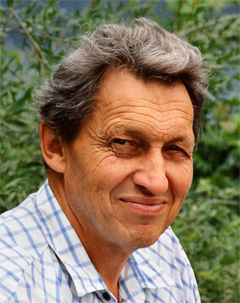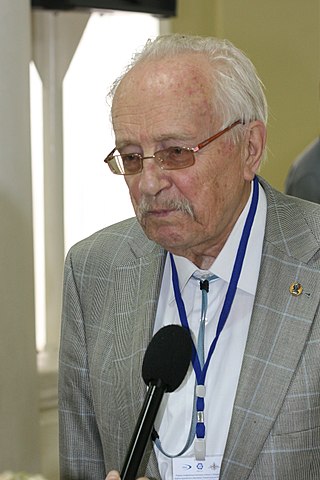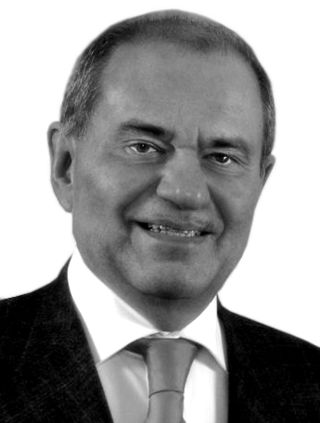
Fyodor Mikhailovich Dostoevsky, sometimes transliterated as Dostoyevsky, was a Russian novelist, short story writer, essayist and journalist. Numerous literary critics regard him as one of the greatest novelists in all of world literature, as many of his works are considered highly influential masterpieces.
Revaz Dogonadze was a notable Georgian scientist, Corresponding Member of the Georgian National Academy of Sciences (GNAS) (1982), Doctor of Physical & Mathematical Sciences (1966), Professor (1972), one of the founders of Quantum electrochemistry,

Mikhail Mikhailovich Bakhtin was a Russian philosopher, literary critic and scholar who worked on literary theory, ethics, and the philosophy of language. His writings, on a variety of subjects, inspired scholars working in a number of different traditions and in disciplines as diverse as literary criticism, history, philosophy, sociology, anthropology and psychology. Although Bakhtin was active in the debates on aesthetics and literature that took place in the Soviet Union in the 1920s, his distinctive position did not become well known until he was rediscovered by Russian scholars in the 1960s.

Nikoloz (Niko) Muskhelishvili was a renowned Soviet Georgian mathematician, physicist and engineer who was one of the founders and first President (1941–1972) of the Georgian SSR Academy of Sciences. He is often referred by the Russian version of his name, Nikolai Ivanovich Muskhelisvili.
Mikhail Vladimirovich Volkenshtein was a notable Soviet and Russian biophysicist, Corresponding Member of the Russian Academy of Sciences, Professor and Doctor of Sciences. In his publications in English his name is written as M. V. Volkenstein.

Nauka is a Russian publisher of academic books and journals. Established in the USSR in 1923, it was called the USSR Academy of Sciences Publishing House until 1963. Until 1934 the publisher was based in Leningrad, then moved to Moscow. Its logo depicts an open book with Sputnik 1 above it.
Sergey Pavlovich Kurdyumov was a specialist in mathematical physics, mathematical modeling, plasma physics, complexity studies and synergetics from Moscow, Russia.

Anatoly Ivanovich Larkin was a Russian theoretical physicist, universally recognised as a leader in theory of condensed matter, and who was also a celebrated teacher of several generations of theorists.

The Great Russian Encyclopedia is a universal Russian encyclopedia, completed in 36 volumes, published between 2004 and 2017 by Great Russian Encyclopedia, JSC. It was released under the auspices of the Russian Academy of Sciences (RAS) after President Vladimir Putin signed a presidential decree №1156 in 2002. The complete edition was released by 2017.

Dmitry Vasil'evich Shirkov was a Russian theoretical physicist, known for his contribution to quantum field theory and to the development of the renormalization group method.
Greta Gaard is an ecofeminist writer, scholar, activist, and documentary filmmaker. Gaard's academic work in the realms of ecocriticism and ecocomposition is widely cited by scholars in the disciplines of composition and literary criticism. Her theoretical work extending ecofeminist thought into queer theory, queer ecology, vegetarianism, and animal liberation has been influential within women's studies. A cofounder of the Minnesota Green Party, Gaard documented the transition of the U.S. Green movement into the Green Party of the United States in her book, Ecological Politics. She is currently a professor of English at University of Wisconsin-River Falls and a community faculty member in Women's Studies at Metropolitan State University, Twin Cities.
Ljubov Zinovjevna Sova is a Russian philologist notable for contributions in the field of linguistics and orientalistics. Her main fields of professional interest include linguistics, African philology, semiotics, typology, Slavic languages and journalism.

Dmitry Valerevich Bisikalo is a Russian astrophysicist and an expert in the interaction of binary stars. He is a member of the Russian Academy of Sciences, the IAU, Acting Chief of the Scientific Secretary of the Russian Academy of Sciences and Chief Researcher of the Institute of Astronomy of the Russian Academy of Sciences (RAS).

Roman Katsman is an Israeli professor and researcher of Hebrew and Russian literature. He is Full Professor of the Department of Literature of the Jewish People in Bar-Ilan University.
Tatyana Aleksandrovna Kasatkina is a Russian philosopher, philologist, culture expert, religious scholar and writer. She is an expert in the field of theory of culture, theory of literature, philosophy, religious studies, the works of Fyodor Dostoyevsky and Russian literature of the 19th-21st centuries. She is Doctor of Philology, Head Researcher at the Gorky Institute of World Literature RAS, Head of the Centre “Dostoevsky and World Culture” at the Gorky Institute of World Literature RAS, president of the Research Committee for Dostoyevsky's Artistic Heritage within the Scientific Council for the History of World Culture, RAS. She is Editor-in-Chief of the peer-reviewed open-access journal "Dostoevsky and World Culture. Philological journal".

Alexei Dzhermenovich Gvishiani is a well-known Russian scientist, full member (academician) of the Russian Academy of Sciences (RAS). Chief Scientist of the Geophysical Center of RAS. Member of the Scientific Coordinating Council of the Federal Agency of Scientific organizations of Russia (FASO) and the Expert Council of the Russian Scientific Foundation. Foreign member of the Romanian Academy of Engineering and Technical Sciences and the National Academy of Sciences of Ukraine. Doctor Honoris Causa of the National Technological University of Ukraine, Professor of Lomonosov Moscow State University and the Paris Institute of Earth Physics of the Earth. Chair of the Russian Geophysical Committee and CODATA Committee of the Russian Academy of Sciences, Vice-President of CODATA in 2002-2006. Vice-Chair of the WDC Panel of the International Council for Science (ICSU) (1996—2006). Deputy Chairman of the Committee of System Analysis, RAS. Vice-president of the Scientific Council International Institute for Applied Systems Analysis (IIASA) and IIASA Program Committee Chair (2010—2014). Member of Academia Europaea (2017).

Dyusembaev Anuar is a Kazakh mathematician.
Nina Yakovlevna Dyakonova was a Russian researcher of 19th century English and European literature, full professor, Doctor of Philology, member of the Board of Directors of the International Byron Society, and member of the editorial board of the Russian academic book series Literaturniye pamyatniki. She was an authority in the history of English literature and links between European literatures with each other and with Russian literature, especially of the 19th century, following her professor Mikhail P. Alexeyev.
Alexei Yur'evich Morozov is a wide-profile theoretical physicist known for his interests and achievements in variety of subjects ranging from traditional particle physics to modern abstract field theory, knot theory, integrable systems and quantum algebra. In particular, he is one of the founders of perturbative string theory techniques and one of the discoverers of hidden symmetries in integrable quantum field theory models, mostly matrix models. Alexei Morozov has created a research group that gathered scientists from different Moscow institutes together.

Valentine Pavlovich Vishnevsky is a Ukrainian economist., Fellow of the National Academy of Sciences of Ukraine (2012) and professor of economics (2005). The area of his scientific interests includes economic theory, modelling of economic systems, fiscal, monetary and industrial policy.












